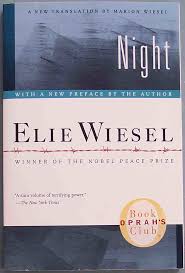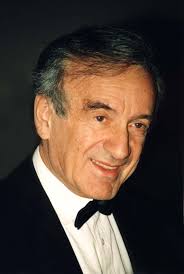Night
"Night" is a work by Elie Wiesel about his experience with his father in the Nazi German concentration camps at Auschwitz and Buchenwald in 1944–1945, at the height of the Holocaust toward the end of the Second World War. In just over 100 pages of sparse and fragmented narrative, Wiesel writes about the death of God and his own increasing disgust with humanity, reflected in the inversion of the parent–child relationship, as his father declines to a helpless state and Wiesel becomes his resentful teenage caregiver. "If only I could get rid of this dead weight ... Immediately I felt ashamed of myself, ashamed forever." In Night everything is inverted, every value destroyed. "Here there are no fathers, no brothers, no friends", a kapo tells him. "Everyone lives and dies for himself alone."
Wiesel was 16 when Buchenwald was liberated by the United States Army in April 1945, too late for his father, who died after a beating while Wiesel lay silently
Genre: Drama, History
Genre: Drama, History
- Year:
- 1960
- 826 Views
They called him Moishe the Beadle, as if his entire life he had never had a surname. He was the jack-of-all-trades in a Hasidic house of prayer, a shtibl. The Jews of Sighet—the little town in Transylvania where I spent my childhood—were fond of him. He was poor and lived in utter penury. As a rule, our townspeople, while they did help the needy, did not particularly like them. Moishe the Beadle was the exception. He stayed out of people's way. His presence bothered no one. He had mastered the art of rendering himself insignificant, invisible. Physically, he was as awkward as a clown. His waiflike shyness made people smile. As for me, I liked his wide, dreamy eyes, gazing off into the distance. He spoke little. He sang, or rather he chanted, and the few snatches I caught here and there spoke of divine suffering, of the Shekhinah in Exile, where, according to Kabbalah, it awaits its redemption linked to that of man. I met him in 1941. I was almost thirteen and deeply observant. By day I studied Talmud and by night I would run to the synagogue to weep over the destruction of the Temple. One day I asked my father to find me a master who could guide me in my studies of Kabbalah. "You are too young for that. Maimonides tells us that one must be thirty before venturing into the world of mysticism, a world fraught with peril. First you must study the basic subjects, those you are able to comprehend." My father was a cultured man, rather unsentimental. He rarely displayed his feelings, not even within his family, and was more involved with the welfare of others than with that of his own kin. The Jewish community of Sighet held him in highest esteem; his advice on public and even private matters was frequently sought. There were four of us children. Hilda, the eldest; then Bea; I was the third and the only son; Tzipora was the youngest. My parents ran a store. Hilda and Bea helped with the work. As for me, my place was in the house of study, or so they said. "There are no Kabbalists in Sighet," my father would often tell me. He wanted to drive the idea of studying Kabbalah from my mind. In vain. I succeeded on my own in finding a master for myself in the person of Moishe the Beadle. He had watched me one day as I prayed at dusk. "Why do you cry when you pray?" he asked, as though he knew me well. "I don't know," I answered, troubled. I had never asked myself that question. I cried because because something inside me felt the need to cry. That was all I knew. "Why do you pray?" he asked after a moment. Why did I pray? Strange question. Why did I live? Why did I breathe? "I don't know," I told him, even more troubled and ill at ease. "I don't know." From that day on, I saw him often. He explained to me, with great emphasis, that every question possessed a power that was lost in the answer... Man comes closer to God through the questions he asks Him, he liked to say. Therein lies true dialogue. Man asks and God replies. But we don't understand His replies. We cannot understand them. Because they dwell in the depths of our souls and remain there until we die. The real answers, Eliezer, you will find only within yourself. "And why do you pray, Moishe?" I asked him. "I pray to the God within me for the strength to ask Him the real questions." We spoke that way almost every evening, remaining in the synagogue long after all the faithful had gone, sitting in the semidarkness where only a few half-burnt candles provided a flickering light. One evening, I told him how unhappy I was not to be able to find in Sighet a master to teach me the Zohar, the Kabbalistic works, the secrets of Jewish mysticism. He smiled indulgently. After a long silence, he said, "There are a thousand and one gates allowing entry into the orchard of mystical truth. Every human being has his own gate. He must not err and wish to enter the orchard through a gate other than his own. That would present a danger not only for the one entering but also for those who are already inside." And Moishe the Beadle, the poorest of the poor of Sighet, spoke to me for hours on end about the Kabbalah's revelations and its mysteries. Thus began my initiation. Together we would read, over and over again, the same page of the Zohar. Not to learn it by heart but to discover within the very essence of divinity. And in the course of those evenings I became convinced that Moishe the Beadle would help me enter eternity, into that time when question and answer would become ONE. AND THEN, one day all foreign Jews were expelled from Sighet. And Moishe the Beadle was a foreigner. Crammed into cattle cars by the Hungarian police, they cried silently. Standing on the station platform, we too were crying. The train disappeared over the horizon; all that was left was thick, dirty smoke. Behind me, someone said, sighing, "What do you expect? That's w a r ... " The deportees were quickly forgotten. A few days after they left, it was rumored that they were in Galicia, working, and even that they were content with their fate. Days went by. Then weeks and months. Life was normal again. A calm, reassuring wind blew through our homes. The shopkeepers were doing good business, the students lived among their books, and the children played in the streets. One day, as I was about to enter the synagogue, I saw Moishe the Beadle sitting on a bench near the entrance. He told me what had happened to him and his companions. The train with the deportees had crossed the Hungarian border and, once in Polish territory, had been taken over by the Gestapo. The train had stopped. The Jews were ordered to get off and onto waiting trucks. The trucks headed toward a forest. There everybody was ordered to get out. They were forced to dig huge trenches. When they had finished their work, the men from the Gestapo began theirs. Without passion or haste, they shot their prisoners, who were forced to approach the trench one by one and offer their necks. Infants were tossed into the air and used as targets for the machine guns. This took place in the Galician forest, near Kolomay. How had he, Moishe the Beadle, been able to escape? By a miracle. He was wounded in the leg and left for dead...
Translation
Translate and read this book in other languages:
Select another language:
- - Select -
- 简体中文 (Chinese - Simplified)
- 繁體中文 (Chinese - Traditional)
- Español (Spanish)
- Esperanto (Esperanto)
- 日本語 (Japanese)
- Português (Portuguese)
- Deutsch (German)
- العربية (Arabic)
- Français (French)
- Русский (Russian)
- ಕನ್ನಡ (Kannada)
- 한국어 (Korean)
- עברית (Hebrew)
- Gaeilge (Irish)
- Українська (Ukrainian)
- اردو (Urdu)
- Magyar (Hungarian)
- मानक हिन्दी (Hindi)
- Indonesia (Indonesian)
- Italiano (Italian)
- தமிழ் (Tamil)
- Türkçe (Turkish)
- తెలుగు (Telugu)
- ภาษาไทย (Thai)
- Tiếng Việt (Vietnamese)
- Čeština (Czech)
- Polski (Polish)
- Bahasa Indonesia (Indonesian)
- Românește (Romanian)
- Nederlands (Dutch)
- Ελληνικά (Greek)
- Latinum (Latin)
- Svenska (Swedish)
- Dansk (Danish)
- Suomi (Finnish)
- فارسی (Persian)
- ייִדיש (Yiddish)
- հայերեն (Armenian)
- Norsk (Norwegian)
- English (English)
Citation
Use the citation below to add this book to your bibliography:
Style:MLAChicagoAPA
"Night Books." Literature.com. STANDS4 LLC, 2024. Web. 19 Apr. 2024. <https://www.literature.com/book/night_336>.




Discuss this Night book with the community:
Report Comment
We're doing our best to make sure our content is useful, accurate and safe.
If by any chance you spot an inappropriate comment while navigating through our website please use this form to let us know, and we'll take care of it shortly.
Attachment
You need to be logged in to favorite.
Log In